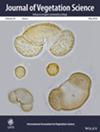Novel Fires Shift Biological Legacies Away From Natural Regeneration in Caribbean Tropical Dry Forest
Abstract
Aims
Understanding ecosystem resilience to environmental change requires evaluating how novel disturbances affect biological legacies that influence regeneration. Legacies that help maintain conditions for recovery may be lost if disturbance regimes change and species lack the necessary adaptive responses. This study assesses the short- and longer-term impacts of fire in Caribbean tropical dry forests with limited burn history to determine their resilience and identify functional traits predicting postfire resprouting strategies.
Location
The study was conducted in tropical dry forests of SW Puerto Rico along a 29-year postfire chronosequence.
Methods
We examined community-level measures of structure, composition, diversity, and resprouting of woody plants in sites ranging from 2 months to 29 years postfire, comparing them to mature forests. Additionally, we tested whether functional traits—relative bark thickness, specific leaf area, and tree size—could predict postfire resprouting strategies.
Results
Tropical dry forest sites with limited burn history exhibited little structural resistance to fire, though significant basal resprouting was observed among tree communities. Over the long term, the chronosequence did not show recovery trends in structural, compositional, or diversity metrics toward mature forest conditions. Fire negatively impacted biological legacies important to forest regeneration, including reducing canopy density, enhancing abiotic stressors, and creating conditions conducive to exotic grass invasion and recurring fire. Functional traits such as relative bark thickness, specific leaf area, and stem number were key predictors of resprouting strategies, highlighting diverse regeneration responses among Caribbean tropical dry forest species.
Conclusions
Puerto Rican tropical dry forest is not resilient to fire, as it disrupts biological legacies critical for regeneration and promotes transitions to degraded states that are difficult to restore. While resprouting remains a postfire legacy, fire alters ecosystem dynamics in ways that challenge long-term recovery. A conceptual model is proposed to illustrate how fire disrupts regeneration processes in Caribbean tropical dry forest.


 求助内容:
求助内容: 应助结果提醒方式:
应助结果提醒方式:


